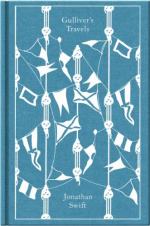|
This section contains 9,405 words (approx. 32 pages at 300 words per page) |

|
SOURCE: "The Parables of the Younger Son (II): Swift and the Containment of Desire," in The Origins of the English Novel, 1600-1740, The Johns Hopkins University Press, 1987, pp. 338-56.
In the following essay, McKeon discusses how Gulliver reveals Swift's pessimism concerning one's ability to transcend his or her political and social status because of predetermining cultural forces and inescapable material realities.
1
For a brief time fellow servants of the Tory ministry, [Daniel] Defoe and Swift were never on close, or even cordial, terms. The cultural gulf between the two men, evident enough in their educational and religious differences, can be felt most palpably as a matter of social status. Swift's utter disdain—in 1706 he disingenuously referred to Defoe as "the fellow that was pilloryed, I have forgot his name"—elicited an exasperated defensiveness that supports the contention that Defoe "lashed out at Swift less as an individual than...
|
This section contains 9,405 words (approx. 32 pages at 300 words per page) |

|


